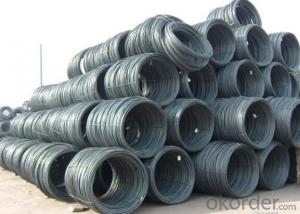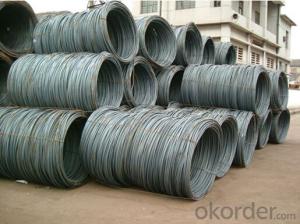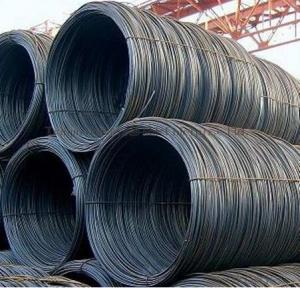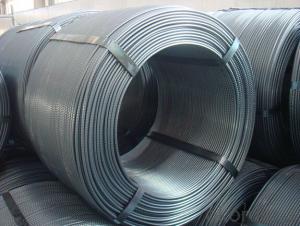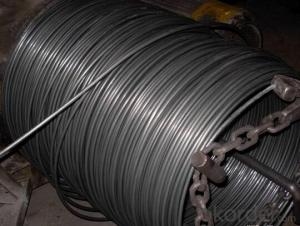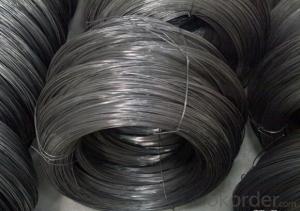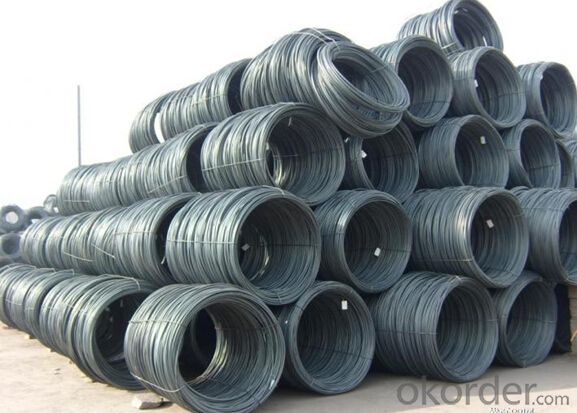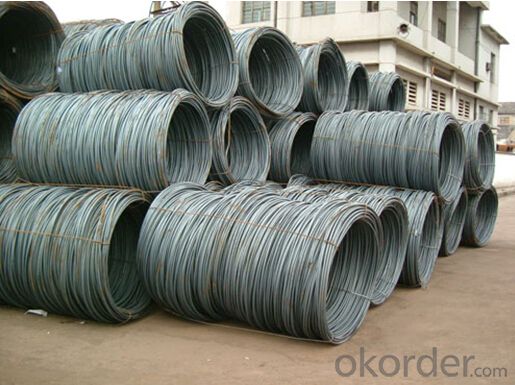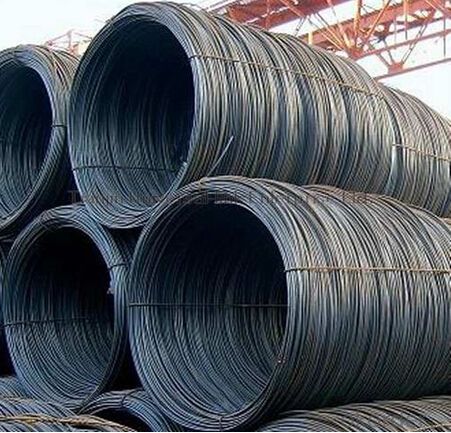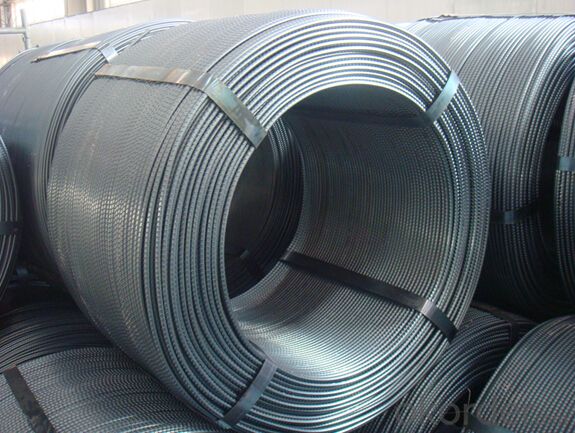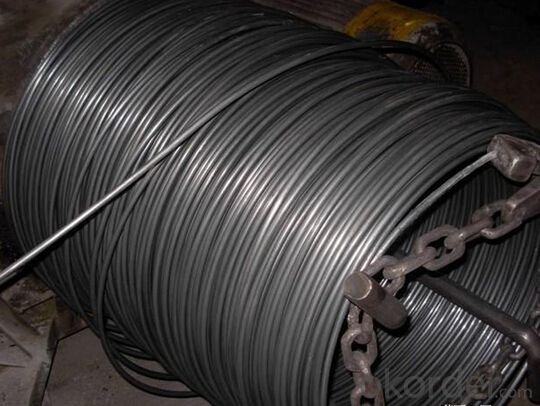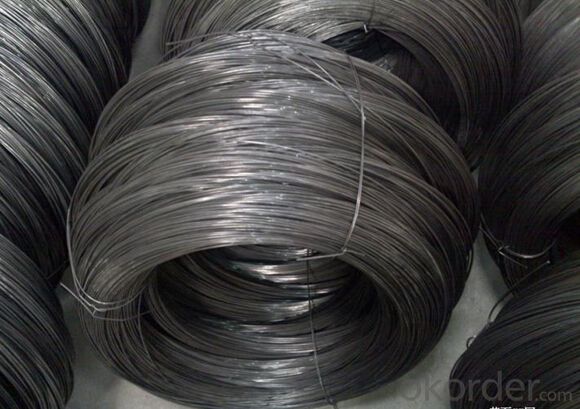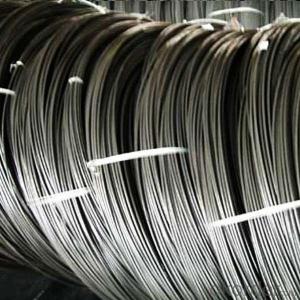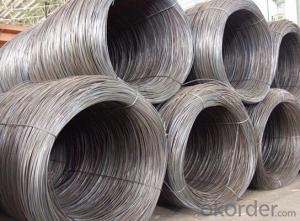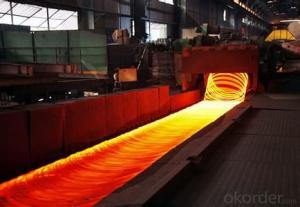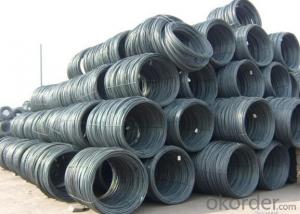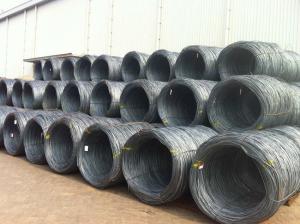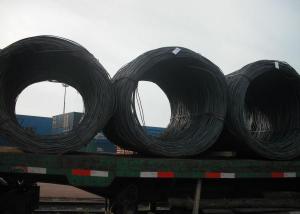Grade Q195 Low Carbon Steel Wire Rod/MS Wire Rod in Coils
- Loading Port:
- Tianjin
- Payment Terms:
- TT OR LC
- Min Order Qty:
- 3 m.t.
- Supply Capability:
- 10000 m.t./month
OKorder Service Pledge
Quality Product, Order Online Tracking, Timely Delivery
OKorder Financial Service
Credit Rating, Credit Services, Credit Purchasing
You Might Also Like
Specification
Type:
Carbon Steel,Alloy Steel,Spring Steel,Bearing Steel,Gear Steel,Deformed Steel,Stainless Steel
Shape:
Steel Coil,Steel Sheet,Steel Wire Rod,Steel Flat Bar,Steel Square Bar,Steel Angle,Steel Round Bar,Steel Billets
Technique:
Hot Rolled,Cold Rolled,Cold Drawn,ERW,Forged,Saw,Extruded,EFW,Spring
Surface Treatment:
PVDF Coated,Black,Bright,Polished,Chromed Passivation,Dry,Oiled,Color Coated,Copper Coated,Coated,Galvanized
Certification:
SGS,ISO,BV,BSI,API,CE,RoHS,IBR,UL
Thickness:
5-20mm
Width:
5-20mm
Length:
In Coils
Outer Diameter:
5-20mm
Net Weight:
2m.t.
Packaging:
Seaworthy packaging
Grade Q195 Low Carbon Steel Wire Rod/MS Wire Rod in Coils
Detailed Information of the Grade Q195 Low Carbon Steel Wire Rod/MS Wire Rod in Coils
| Name | Hot Rolled High Carbon Wire Rod |
| Shape | Round Bar/Square Bar/Flat Bar/Plate/Wire |
| Standard | GB/ASTM/SAE/AISI/DIN/JIS/EN/BS |
| Surface Treatment: | Black/Peeling/Polished/Machined |
| Delivery Condition: | Hot Rolled or Forged/Peeled or Black Surface |
| Test | SGS/UT 100% Elements Testing |
| Certificate: | ISO/Mill Certificate |
| Service: | 24 hours online service / |
| more than 20 years trading and manufacture | |
| Quality Assurance: | the third party inspection, such as SGS, BV, TUV…etc. is acceptable |
| Packaging Details: | Seaworthy Packaging or as per customer's packing instruction |
Chemical Composition of the Grade Q195 Low Carbon Steel Wire Rod/MS Wire Rod in Coils
| Grade | Chemical Composition(%) | |||||
| C | Mn | Si | S | P | B | |
| SAE1008 | 0.1max. | 0.3~0.50 | 0.15max | 0.050max | ≤0.040 | >0.0008 |
| Mechanical properties | ||||||
| Yield strength(N/mm2) | Tensile strength(N/mm2) | Elongation(%) | ||||
| 250-280 | 350-380 | ≥32 | ||||
Company Introduction the Grade Q195 Low Carbon Steel Wire Rod/MS Wire Rod in Coils
CNBM International Corporation is the most import and export platform of CNBM group(China National Building Material Group Corporation) ,which is a state-owned enterprise, ranked in 270th of Fortune Global 500 in 2015.
With its advantages, CNBM International are mainly concentrate on Cement, Glass, Iron and Steel, Ceramics industries and devotes herself for supplying high quality series of refractories as well as technical consultancies and logistics solution.
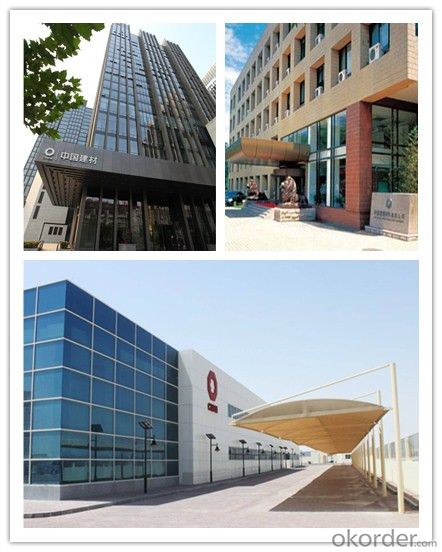
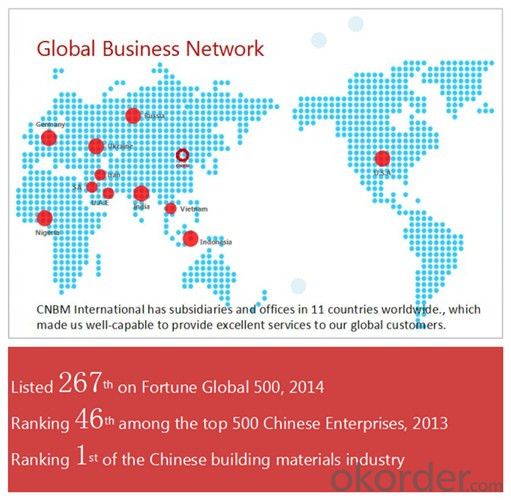
| After-sale service | CNBM provides the services and support you need for every step of our cooperation. We’re the business partners you can trust; you can relax and get on with doing business. |
| For any problem, please kindly contact us at any your convenient time, we’ll reply you in our first priority within 24 hours | |
| Advantages | Industry experience over 20 years. |
| Shipment of goods -More than 70 countries worldwide. | |
| The most convenient transport and prompt delivery. | |
| Competitive price with best service. | |
| High technical production line with top quality products. | |
| High reputation based on best quality products. |
Packaging & Delivery the Grade Grade Q195 Low Carbon Steel Wire Rod/MS Wire Rod in Coils
| Packaging Detail | Sea worthy packing /as per customer's packing instruction |
| Delivery Detail | 15 ~ 40 days after receiving the deposit |
Products Show
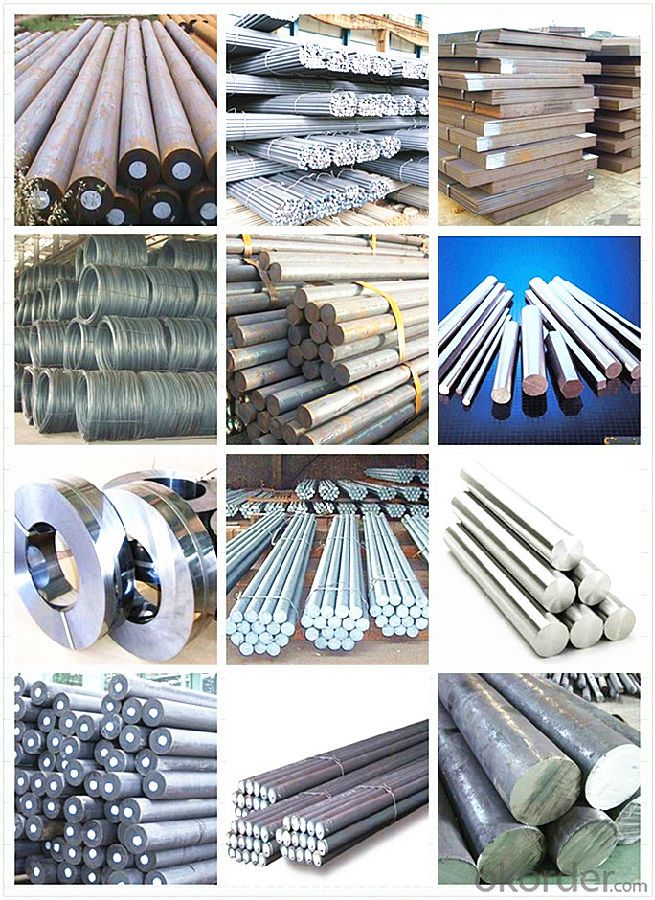
FAQ:
| Are you a trader or manufacturer? | Manufacturer |
| What’s the MOQ? | 3 metric ton |
| What’s your delivery time? | 15-35 days after downpayment received |
| Do you Accept OEM service? | Yes |
| what’s your delivery terms? | FOB/CFR/CIF |
| What's the Payment Terms? | 30% as deposit,70% before shipment by T/T |
| Western Union acceptable for small amount. | |
| L/C acceptable for large amount. | |
| Scrow ,Paybal,Alipay are also ok | |
| Why choose us? | Chose happens because of quality, then price, We can give you both. |
| Additionally, we can also offer professional products inquiry, products knowledge train (for agents), smooth goods delivery, excellent customer solution proposals. | |
| What's your available port of Shipment? | Main Port, China |
| What’s your featured services? | Our service formula: good quality+ good price+ good service=customer's trust |
| Where are your Market? | Covering more than 160 countries in the world |
- Q: What are the main applications of special steel in the defense electronics?
- Special steel is used in defense electronics for a variety of applications. It is primarily utilized in the manufacturing of critical components such as casings, connectors, and circuit boards due to its exceptional strength, durability, and resistance to corrosion. Special steel's high magnetic permeability also makes it suitable for electromagnetic shielding, which is crucial in protecting electronic devices from external interference. Moreover, its heat resistance and ability to withstand extreme temperatures enable it to be used in electronic systems that operate in harsh environments. Overall, special steel plays a vital role in enhancing the reliability and performance of defense electronics.
- Q: What are the main characteristics of corrosion-resistant steel?
- Stainless steel, also referred to as corrosion-resistant steel, possesses distinct qualities that render it highly resistant to corrosion. Below are the primary attributes of this type of steel: 1. Exceptional resistance to corrosion: An essential feature of corrosion-resistant steel is its capacity to withstand corrosion. This is achieved through the addition of specific alloying elements, namely chromium, nickel, and molybdenum, which generate a protective layer on the steel's surface. This layer, known as the passive layer, prevents the steel from coming into contact with corrosive substances, including moisture, chemicals, and acids. 2. Superb durability: Corrosion-resistant steel boasts remarkable durability, making it suitable for diverse applications in harsh environments. It can endure extreme temperatures, high humidity levels, and corrosive chemicals without deteriorating or compromising its structural integrity. This durability ensures that structures constructed from corrosion-resistant steel enjoy an extended service life, thereby reducing the need for frequent maintenance and replacements. 3. Aesthetically pleasing: In addition to its functionality, corrosion-resistant steel offers aesthetic appeal. Its smooth and polished surface bestows it with a visually pleasing appearance, rendering it a popular choice for architectural applications, interior design, and decorative elements. The ability to maintain its appearance over time, without rusting or discoloration, enhances its desirability in both industrial and residential settings. 4. High strength: Renowned for its strength and toughness, corrosion-resistant steel retains its mechanical properties even in corrosive environments. Consequently, it can withstand heavy loads, impacts, and other external forces, making it suitable for applications where structural integrity and safety are paramount. Examples include bridges, buildings, marine equipment, and automotive components. 5. Versatility: Corrosion-resistant steel exhibits versatility in terms of its applications. It can be easily fabricated, welded, machined, and formed into various shapes and sizes, thereby allowing for customization and adaptability. This versatility renders it ideal for a wide array of industries, encompassing construction, aerospace, automotive, chemical processing, and marine. 6. Hygienic properties: Another crucial characteristic of corrosion-resistant steel lies in its hygienic properties. Its non-porous surface impedes the growth of bacteria, making it suitable for applications in the food and beverage industry, healthcare facilities, and pharmaceutical manufacturing. Furthermore, its ease of cleaning and maintenance further bolsters its hygiene standards. In summary, corrosion-resistant steel seamlessly combines exceptional resistance to corrosion with durability, strength, versatility, and aesthetic appeal. These characteristics render it a dependable and cost-effective material for various industries, ensuring long-term performance and protection against the detrimental effects of corrosion.
- Q: How is high-temperature alloy steel used in the production of heat exchangers?
- High-temperature alloy steel is used in the production of heat exchangers due to its exceptional heat resistance and strength properties. This type of steel can withstand high temperatures without deforming or losing its mechanical properties, making it ideal for handling hot fluids or gases in heat exchange processes. The alloy's ability to resist corrosion and oxidation further enhances its suitability for this application. Overall, high-temperature alloy steel ensures the durability and efficiency of heat exchangers in various industries such as power generation, chemical processing, and petroleum refining.
- Q: What are the different coating techniques used for special steel?
- There are several different coating techniques used for special steel, including hot-dip galvanizing, electroplating, powder coating, and thermal spraying. Each technique has its own advantages and applications, providing enhanced protection against corrosion, improved aesthetics, or increased durability depending on the specific requirements of the steel.
- Q: What are the applications of special steel in the electronics industry?
- Special steel is widely used in the electronics industry due to its unique properties and benefits. Some of the applications of special steel in this industry include the manufacturing of electronic components, such as connectors, springs, and contacts, which require high strength and corrosion resistance. Special steel is also used in the production of magnetic cores for transformers and inductors, as it exhibits excellent magnetic properties. Additionally, special steel is utilized in the fabrication of precision tools and equipment used in electronics manufacturing processes, ensuring high precision, durability, and reliability. Overall, the applications of special steel in the electronics industry contribute to enhanced performance, efficiency, and longevity of electronic devices and systems.
- Q: Can special steel be used in the semiconductor manufacturing industry?
- Yes, special steel can be used in the semiconductor manufacturing industry. Special steel alloys with high levels of purity and specific properties, such as high thermal conductivity and resistance to corrosion, can be utilized in various applications within semiconductor manufacturing, including the fabrication of specialized tools, equipment, and components.
- Q: What is the process of manufacturing special steel?
- The process of manufacturing special steel involves several steps to ensure the production of high-quality and durable steel with specific properties. 1. Raw Materials Selection: The first step is to carefully select the raw materials required for making special steel. This includes iron ore, coal, and other alloying materials such as chromium, nickel, and manganese, depending on the desired properties of the final product. 2. Melting: The selected raw materials are then melted in a large furnace, often through the use of electric arc furnaces or basic oxygen furnaces. These furnaces heat the raw materials to extremely high temperatures, typically around 1,600 to 2,000 degrees Celsius, to transform them into molten metal. 3. Refining: Once the raw materials are melted, the molten metal undergoes a refining process to remove impurities. This is done through techniques like degassing, desulphurization, and deoxidation, ensuring that the steel is free from unwanted elements that may negatively impact its properties. 4. Alloying: After refining, alloying elements are added to the molten metal to achieve the desired properties. These elements can modify the steel's strength, hardness, corrosion resistance, and other characteristics. The specific alloying elements and their proportions depend on the intended application of the special steel. 5. Continuous Casting: The molten steel is then poured into a continuous casting machine, which solidifies it into semi-finished products called billets, blooms, or slabs. This continuous casting process ensures a consistent and uniform structure throughout the steel. 6. Hot Rolling: The semi-finished products are then reheated and passed through a series of hot rolling mills. This process involves reducing the thickness and shaping the steel into various forms such as bars, rods, plates, or sheets, depending on the intended use. 7. Heat Treatment: After hot rolling, the steel may undergo heat treatment processes such as annealing, quenching, tempering, or case hardening. These treatments help to further enhance the mechanical properties of the steel, such as its hardness, toughness, and ductility. 8. Finishing: The final step involves surface finishing and quality control measures. The steel is inspected for any defects or imperfections that may have occurred during the manufacturing process. Surface treatments like pickling or galvanizing can also be applied to enhance the steel's appearance and protect it from corrosion. Overall, the process of manufacturing special steel is a complex and precise operation that requires careful selection of raw materials, melting, refining, alloying, continuous casting, hot rolling, heat treatment, and finishing. This ensures that the resulting steel meets the specific requirements and performance characteristics demanded by various industries.
- Q: How does special steel perform under extreme temperatures?
- Special steel is specifically designed to perform well under extreme temperatures. It exhibits excellent strength, hardness, and resistance to heat, making it highly suitable for applications that involve extreme heat or cold. At high temperatures, special steel maintains its structural integrity, which means it does not undergo significant deformation or loss of strength. It retains its hardness and dimensional stability, ensuring that it can withstand the extreme conditions without compromising its performance. Special steel also demonstrates exceptional resistance to thermal expansion and contraction, which is crucial when exposed to extreme temperature changes. This property allows the steel to expand and contract uniformly, minimizing the risk of cracking or other forms of damage. Moreover, special steel possesses excellent heat resistance, enabling it to retain its mechanical properties even at elevated temperatures. It exhibits high creep resistance, which is the ability to resist deformation under constant stress at high temperatures. This ensures that the steel can withstand prolonged exposure to extreme heat without experiencing failure or degradation. In addition to its impressive performance at high temperatures, special steel also performs well under extremely low temperatures. It maintains its toughness and ductility, with minimal risk of embrittlement or cracking. This makes it suitable for applications in cryogenic environments, such as in the aerospace or medical industries. Overall, special steel is designed to excel under extreme temperatures, offering exceptional strength, hardness, and resistance to heat. Its ability to maintain its structural integrity, resist thermal expansion and contraction, and withstand high or low temperatures makes it a reliable choice for various demanding applications.
- Q: How is special steel used in the telecommunications industry?
- Special steel is used in the telecommunications industry for various applications, such as the construction of transmission towers, antenna supports, and satellite equipment. Its high strength, corrosion resistance, and durability make it ideal for withstanding harsh environmental conditions and ensuring the stability and reliability of telecommunications infrastructure.
- Q: What are the main applications of special steel in the defense equipment?
- Special steel is widely used in defense equipment due to its unique properties. One of the main applications of special steel in defense is for manufacturing armor and ballistic protection, ensuring the safety of military personnel and vehicles in combat. It is also used in the production of military aircraft, submarines, and ships, providing strength, durability, and resistance to extreme conditions. Special steel is further utilized in the production of firearms and ammunition, offering high strength and reliability. Overall, the main applications of special steel in defense equipment revolve around enhancing protection, performance, and longevity in critical military applications.
Send your message to us
Grade Q195 Low Carbon Steel Wire Rod/MS Wire Rod in Coils
- Loading Port:
- Tianjin
- Payment Terms:
- TT OR LC
- Min Order Qty:
- 3 m.t.
- Supply Capability:
- 10000 m.t./month
OKorder Service Pledge
Quality Product, Order Online Tracking, Timely Delivery
OKorder Financial Service
Credit Rating, Credit Services, Credit Purchasing
Similar products
Hot products
Hot Searches
Related keywords
